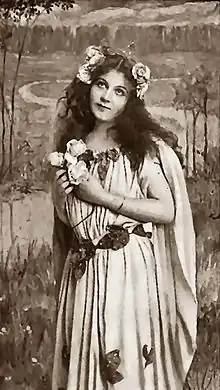Florence Barker (actress)
Florence Barker (November 22, 1891 – February 15, 1913) was an American stage and silent film actress from Los Angeles.
Florence Barker | |
|---|---|
 Burr McIntosh Monthly, January, 1908 | |
| Born | November 22, 1891 |
| Died | February 15, 1913 (aged 21) Los Angeles, California |
| Other names | Priscilla May |
| Years active | 1905-1912 |
She began in amateur theatre in her early teens,[1] and her professional debut came in the Ferris Company's production of The Altar of Friendship in Los Angeles in 1907.[2] By age 18, she was playing lead roles at the Grand Theatre in Los Angeles.[1]
At around this time she started acting in motion pictures and went on to appear in at least 63 films. For several years, Barker was the Biograph Company's leading woman. She also worked in Paris and London as the leading woman with the Pathé Freres film company. By 1912, she was performing for Powers Picture Plays.[3]
Barker died of pneumonia in Los Angeles at the age of 21.[4]
Selected filmography
| Year | Title | Role | Notes |
|---|---|---|---|
| 1908 | An Awful Moment | ||
| 1909 | The Girls and Daddy | ||
| Getting Even | |||
| Choosing a Husband | Gladys | ||
| 1910 | The Englishman and the Girl | ||
| Faithful | John's Sweetheart | ||
| The Two Brothers | Mexican | ||
| The Kid | Doris Marshall | ||
| The Oath and the Man | Madame Prevost | ||
| 1911 | The Two Paths | ||
| His Daughter | Mary | ||
| Priscilla's April Fool Joke | Priscilla | ||
| Priscilla and the Umbrella | Priscilla | ||
| 1912 | A Voice from the Deep |
References
- McIntosh, Burr; Hobart, Clark (January 1908). "Our Portraits". The Burr McIntosh Monthly. 15 (58). Retrieved November 21, 2018.
- "The Drama -- Players, Playhouses, Gossip of the Stage". The Los Angeles Times. California, Los Angeles. March 3, 1907. p. Part VI - 1. Retrieved November 21, 2018 – via Newspapers.com.

- "Who's Who in Picturedom -- Miss Florence Barker of the Powers Picture Plays". Buffalo Courier. New York, Buffalo. September 15, 1912. p. 8. Retrieved January 24, 2021 – via Newspapers.com.
- Silent Film Necrology: Births and Deaths of Over 9000 Performers, Directors, Producers and other Filmmakers of The Silent era, through 1993: Eugene Michael Vazzana; - 1995: pg. 17
External links
Wikimedia Commons has media related to Florence Barker (actress).
This article is issued from Wikipedia. The text is licensed under Creative Commons - Attribution - Sharealike. Additional terms may apply for the media files.